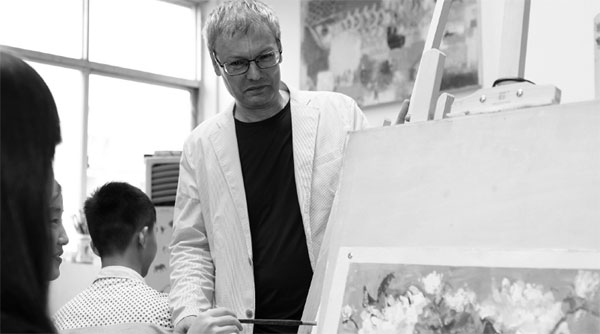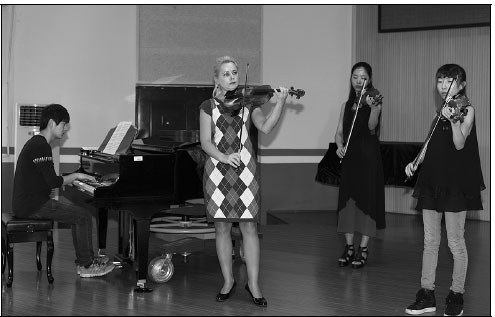Magic on canvas
Updated: 2015-07-10 07:30
By Yang Yang(China Daily)
|
|||||||||||
A Russian teaches Chinese the art of oil painting. Yang Yang reports in Hunan province.
It is a rainy morning in June, when Vladimir Gannin carries one of his paintings to Hunan Institute of Technology and Science in Central China's Yueyang city.
His students here are learning about oil works depicting flowers and vases.
The 47-year-old Russian teacher of oil painting then puts down his piece and asks his students to look at a wall of their campus studio, where some of Gannin's unfinished works are displayed.
Among them is one on which he has painted feng shui and yin and yang symbols, a gold fish and a gold toad representing wealth and good luck for Chinese.
His works are rendered postmodern with a mix of Chinese and Western cultural elements.
"Chinese people have a very good system of feng shui. People believe in it especially in the south in places like Guangzhou, Hong Kong and Macao," he says.
But Gannin hadn't noticed the feng shui system until he held an exhibition of his paintings in Guangzhou a few years ago, he says. A local man there went up to him and asked to buy six of his artworks. But the sale didn't proceed as the man wanted to return with a friend the following day to get the paintings vetted.
When that man and his friend arrived, they decided that instead of six, only two paintings would be purchased by them.
"It turned out that the man's friend was a feng shui master. He said, there was a knife in one of my paintings, which isn't considered good for feng shui, and that there was a pear in another, which was also a bad sign," Gannin recalls.
A native of Vladivostok, Russia, Gannin's association with China began more than a decade ago, when a group of artists from Northeast China's Jilin province went to visit his hometown. As the chairman of an under-30 artists' association, he received the Chinese artists and showed them some art studios and paintings.
In 2001, at the invitation of the same Chinese painters, Gannin went to Changchun in Jilin, a place he found too cold, even for a Russian. But by March 2002, he got the chance to teach oil painting in warmer Hunan. Before Changchun, Gannin knew China mainly through Chinese paintings and kung fu, which he practiced for a while at college.
"When I first saw Chinese paintings, I thought Chinese artists painted huge mountains and waterfalls with their imagination, but when I went to Zhangjiajie in Hunan and to the Huangshan Mountain in Anhui province (East China), I realized there indeed exists that kind of landscape," Gannin says.
At Hunan Institute of Science and Technology, one of Gannin's paintings shows his classification of society based on income. At the bottom are the low-income ordinary people, the next level is for the group that supports and actively engages in politics, the next level has "apolitical, creative" people, according to the artist's impressions, and on top of them are those that run feng shui shops, preceded by more enterprising businesses.
The more upwardly mobile level has Hollywood star Brad Pitt, British super model Naomi Campbell, and members of the Rolling Stones band. At the second-highest level, there are six of the world's richest people including Bill Gates and finally at the very top are US businessman J P Morgan and the Rockefeller family.
"The picture is the revolution of money," he says. "I belong to a low group - the artists."
When asked about his personal style, Gannin points to a small Buddha statue he painted on a big abstract of the Buddha. The small statue may look like its printed, but it's actually painted.
"I love painting in that way, but I also do classical oil paintings because I need to show the techniques to my students."
Gannin has been living with his wife, Anna Gannin, in Yueyang for the past 13 years. His wife has been teaching violin at the same institute. She says when the couple arrived in Yueyang, the green trees and blue lakes made them want to live here. In her younger days, she read ancient Chinese poems in Russian and fell in love with them.
Now, Anna Gannin is trying to translate Chinese poems into Russian, paying most attention to the sound of the words. She herself is writing a Chinese poem that she will recite at a future Russian poetry contest.
At their home, Anna Gannin is seen trying to find her favorite poem on a Huawei cellphone gifted to her husband by President Xi Jinping. In May, Vladimir Gannin was invited to meet Xi in Moscow, where the Chinese leader was attending the 70th anniversary celebrations of the World War II victory. He received an award for Sino-Russia friendship and also the cellphone.
"It's a great honor for us," Anna Gannin says.
Contact the writer at yangyangs@chinadaily.com.cn
|
Vladimir Gannin shares his passion for painting with his young students at Hunan Institute of Technology and Science. Photos Provided To China Daily |
|
Anna Gannin, wife of Vladimir Gannin, teaches violin at Hunan Institute of Technology and Science. |
(China Daily 07/10/2015 page20)
Today's Top News
BRICS 'disappointed' by US failure to ratify IMF reform
BRICS summit condemns WWII 'misrepresentation'
SCO can play major role in Silk Road, Xi says
Stocks surge as government moves to save market
Doubts over heroes' authenticity grow with widening Internet access
Sun and sand is where the wealthy from Chinese mainland head
Chinese stocks plunge to three-month low
Macedonia expects first mutiple unit train from China
Hot Topics
Lunar probe , China growth forecasts, Emission rules get tougher, China seen through 'colored lens', International board,
Editor's Picks

|

|

|

|

|

|








